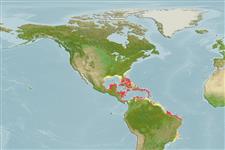Common names from other countries
Teleostei (teleosts) >
Ovalentaria/misc (Various families in series Ovalentaria) >
Pomacentridae (Damselfishes) > Microspathodontinae
Etymology: Stegastes: Greek, stegastos, -e, -on = covered (Ref. 45335).
More on authors: Jordan & Rutter.
Environment: milieu / climate zone / depth range / distribution range
Ecology
Marine; reef-associated; non-migratory; depth range 2 - 45 m (Ref. 9710), usually 2 - 5 m (Ref. 9710). Tropical
Western Atlantic: southern Florida (USA), Bahamas, and Caribbean Sea. Including Antilles and Yucatan to Venezuela (Ref. 26938).
Size / Weight / Age
Maturity: Lm ? range ? - ? cm
Max length : 12.5 cm TL male/unsexed; (Ref. 9710)
Short description
Identification keys | Morphology | Morphometrics
Dorsal spines (total): 12; Dorsal soft rays (total): 15 - 16; Anal spines: 2; Anal soft rays: 13. Anal fin long and pointed, reaching well beyond base of tail (Ref. 26938). Adults dark gray-brown, the edges of the scales blackish; a wash of yellowish often present dorsally on head, nape, and on back below spinous portion of dorsal fin; a small black spot at upper base of pectoral fins; juveniles bright yellow with two bright blue lines dorsally on head, extending to beneath middle of dorsal fin where they break into spots; a large blue-edged black spot basally on dorsal fin centered on last spine (Ref. 13442).
Adults inhabit coral and rocky reefs of sheltered lagoons and inshore areas. Territorial and pugnacious (Ref. 9710). Oviparous, distinct pairing during breeding (Ref. 205). Eggs are demersal and adhere to the substrate (Ref. 205). Males guard and aerate the eggs (Ref. 205). Taken incidentally in traps and small-meshed beach nets (Ref. 5217).
Life cycle and mating behavior
Maturities | Reproduction | Spawnings | Egg(s) | Fecundities | Larvae
Oviparous, distinct pairing during breeding (Ref. 205). Eggs are demersal and adhere to the substrate (Ref. 205). Males guard and aerate the eggs (Ref. 205).
Allen, G.R., 1991. Damselfishes of the world. Mergus Publishers, Melle, Germany. 271 p. (Ref. 7247)
IUCN Red List Status (Ref. 130435)
CITES (Ref. 128078)
Not Evaluated
Threat to humans
Harmless
Human uses
Fisheries: commercial; aquarium: commercial
Tools
Special reports
Download XML
Internet sources
Estimates based on models
Preferred temperature (Ref.
115969): 26.1 - 28.2, mean 27.4 (based on 688 cells).
Phylogenetic diversity index (Ref.
82804): PD
50 = 0.5000 [Uniqueness, from 0.5 = low to 2.0 = high].
Bayesian length-weight: a=0.01950 (0.00893 - 0.04257), b=2.99 (2.81 - 3.17), in cm Total Length, based on LWR estimates for this Genus-body shape (Ref.
93245).
Trophic level (Ref.
69278): 2.0 ±0.00 se; based on food items.
Resilience (Ref.
120179): High, minimum population doubling time less than 15 months (Preliminary K or Fecundity.).
Fishing Vulnerability (Ref.
59153): Low vulnerability (10 of 100).
